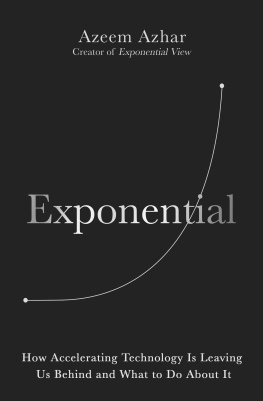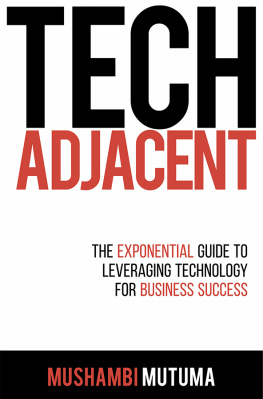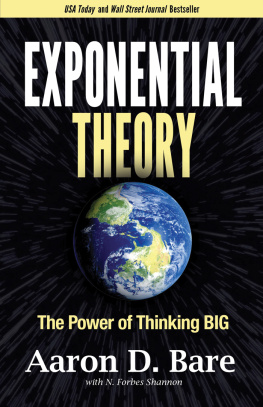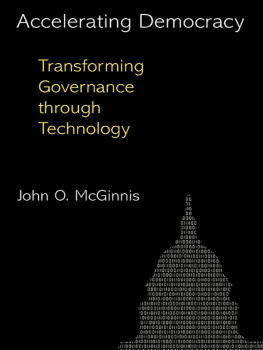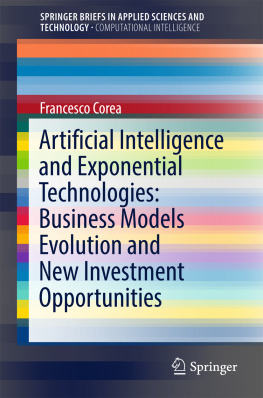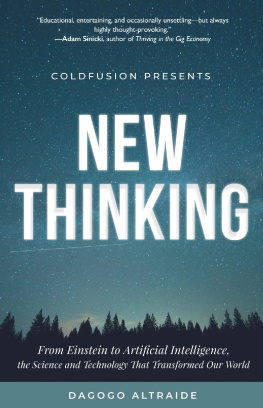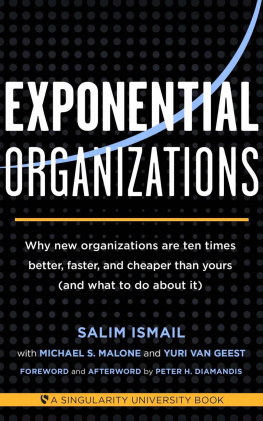Azeem Azhar - Exponential: How Accelerating Technology Is Leaving Us Behind and What to Do About It
Here you can read online Azeem Azhar - Exponential: How Accelerating Technology Is Leaving Us Behind and What to Do About It full text of the book (entire story) in english for free. Download pdf and epub, get meaning, cover and reviews about this ebook. year: 2021, publisher: Random House Business, genre: Romance novel. Description of the work, (preface) as well as reviews are available. Best literature library LitArk.com created for fans of good reading and offers a wide selection of genres:
Romance novel
Science fiction
Adventure
Detective
Science
History
Home and family
Prose
Art
Politics
Computer
Non-fiction
Religion
Business
Children
Humor
Choose a favorite category and find really read worthwhile books. Enjoy immersion in the world of imagination, feel the emotions of the characters or learn something new for yourself, make an fascinating discovery.
- Book:Exponential: How Accelerating Technology Is Leaving Us Behind and What to Do About It
- Author:
- Publisher:Random House Business
- Genre:
- Year:2021
- Rating:4 / 5
- Favourites:Add to favourites
- Your mark:
Exponential: How Accelerating Technology Is Leaving Us Behind and What to Do About It: summary, description and annotation
We offer to read an annotation, description, summary or preface (depends on what the author of the book "Exponential: How Accelerating Technology Is Leaving Us Behind and What to Do About It" wrote himself). If you haven't found the necessary information about the book — write in the comments, we will try to find it.
How humans can learn to thrive in an age of accelerating technology.
EnticingSunday Times
Essential Reid Hoffman, co-founder of LinkedIn
Powerful Hannah Fry, author of Hello World
Brilliant Robert Peston, ITV Political Editor and author of WTF
We are entering the Exponential Age. Between faster computers, better software and bigger data, ours is the first era in human history in which technology is constantly accelerating.
Azeem Azhar - writer, technologist, and creator of the acclaimed Exponential View newsletter - understands this shift better than anyone. Technology, he argues, is developing at an increasing, exponential rate. But human society - from our businesses to our political institutions - can only ever adapt at a slower, incremental pace. The result is an exponential gap, between the power of new technology and our ability to keep up.
In Exponential, Azhar shows how this exponential gap can explain our societys most pressing problems - from established businesses difficulty keeping up with digital platforms, to the sclerotic response of liberal democracies to fast-moving social problems. And he draws on cutting-edge social science to explain how to stop the exponential gap eroding our economies, our politics and our lives.
__
Valuable and timely . . . The importance of the book lies in its diligent and comprehensive definition of a new phase in human affairs. Sunday Times
Comprehensive but lively . . . An essential addition to the ongoing discourse about where remarkable new technologies can take us, and where we should be aiming to go. Highly recommended! Reid Hoffman, co-founder of LinkedIn and author of Blitzscaling
Read this book if you are interested in how we can design a more inclusive and sustainable system with a re-direction of technological change at its centre. Mariana Mazzucato, UCL professor and author of The Value of Everything and Mission Economy
A powerful argument . . . Azeem Azhars writing is informative and accessible, and his prescient ideas are only going to become more important as time goes on. Hannah Fry, BBC Radio 4 presenter and author of Hello World
Azeem Azhar is one of the best-regarded thought leaders in the industry . . . He has a broad understanding of the ways technology can be used to solve our biggest problems, shape our society, and bridge cultural divides. Daniel Ek, co-founder and CEO of Spotify
Azeem Azhar is a globally recognised voice on technology and its impact. He has written a fascinating and important book, required reading for anyone seeking to understand the new economy and the massive global corporations that seek to dominate that economy. Matthew Taylor, Chief Executive, Royal Society of Arts
Azeem Azhar: author's other books
Who wrote Exponential: How Accelerating Technology Is Leaving Us Behind and What to Do About It? Find out the surname, the name of the author of the book and a list of all author's works by series.

